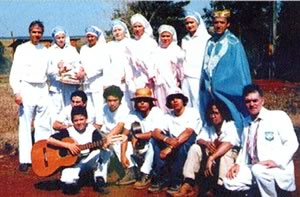![]()
![]()
![]()
 A Paraguayan Pentecostal group, the People of God. recently became particularly controversial in the Italian media, and has been accused by many of being a “cult”. In fact, Italian media are unfamiliar with independent Latin American Pentecostalism, where this group seems to belong to the same category as Mexico’s La Luz del Mundo and other equally controversial groups.
A Paraguayan Pentecostal group, the People of God. recently became particularly controversial in the Italian media, and has been accused by many of being a “cult”. In fact, Italian media are unfamiliar with independent Latin American Pentecostalism, where this group seems to belong to the same category as Mexico’s La Luz del Mundo and other equally controversial groups.
Leonor Paredes (“Brother José”, 1898-1970) was born in Villarica, Paraguay, in 1898. In 1940, he received the baptism of the Holy Spirit and moved to Argentina, where he worked for twenty years as an independent Pentecostal preacher. Following a prophetic warning, in 1963 he returned to Paraguay, where he established the People of God (Pueblo de Dios) community in Repatriación, a village located at some 150 miles from the capital city Asunción. Initially, the community included 22 families.
Brother José died in 1970; his successors as “Leading Elder” was Mariano Bobadilla (“Brother Luke”, 1915-1991), who had converted after his miraculous cure attributed to Brother José’s “key of prayer” in Laguna Blanca (Argentina) in 1946. Brother Luke’s administration fell in difficult time for Paraguay, then ruled by dictator General Alfredo Stroessner (1912-2006). The regime regarded the People of God as a “cult”, and even as potentially “communist” due to its communal organization. Persecution followed, and several leaders, including Brother Luke, were arrested. The group managed to survive mostly thanks to Carlos Marcial Russo Cantero, a distinguished law professor at the National University in Asunción, lawyer and politician who not only successfully represented in court Brother Luke and other leaders, but was eventually so impressed by their message that he converted to the People of God. He joined its congregation Santo Domingo Libertador in Lambare (near Asunción), the largest in the country after the “central congregation” in Repatriación.
It was in the same community of Lambare that Brother Luke died in 1991. His successor was Severiano Estigarribia (“Brother Elias”, 1931-1995), who managed to obtain legal recognition for the community in Paraguay with Presidential Decree No. 14336 of July 28, 1992. Brother Elias died unexpectedly in 1995, and Andrés Fretes (“Brother Juan”) was recognized as Leading Elder. He was born in 1941, and had been a successful missionary to Brazil (the main missionary field for the People of God together with Argentina, Uruguay, Colombia, and Italy; the latter country has provided the second largest constituency for the movement). In 1996, he supervised the establishment of COPROSA (Cooperativa Multiactiva de Producción, Servicions Públicos, Consumo, Ahorros y Crédito San Andres Ltda.), a co-operative enterprise which oversees most economic activities of the People of God. COPROSA has entered into several promising joint ventures with Italian companies, and rival economic interests are not foreign to attacks against this enterprise as “cult-related”.
People of God’s theology is basically Pentecostal, although with some distinctive features. More than the insistence on demons and demonization (not uncommon in contemporary Pentecostalism), what is unique is the practice of celibacy by a number of members, although by no means by all. The People of God insist on miracles, prophecy, the prophetic value of dreams, the charismatic mission of Brother José and his successors. An important practice is the “key of prayer”, where a prayer is repeated seven times, kneeling, followed by a spiritual conversation with God.
The daily life of the some 5,000 members living in Repatriación’s “central congregation” includes communal singing, prayer and work (mostly agricultural: cotton, corn, sunflower, soy), with a strict and rather austere lifestyle (denounced by critics as “cultic”). The “central community” includes schools, from kindergarten to High School, artistic and cultural centres, hospitals, and sport facilities. The Leading Elder (also called Leading Apostle) oversees a hierarchy including twelve Elder Apostles and twelve Lesser Apostles; there are also “Messengers”, or itinerant teachers, sent to the congregations in Paraguay and abroad.
In 1999, the People of God published a rebuttal to its critics, which remains an important historical source: Juan Diosnel Cardozo Vera, La Verdad sobre el Pueblo de Dios. Su historia, organización y doctrina. Asunción: Pueblo de Dios 1999.
![]()
[Home Page] [Cos'» il CESNUR] [Biblioteca del CESNUR] [Testi e documenti] [Libri] [Convegni]
[Home Page] [About CESNUR] [CESNUR Library] [Texts & Documents] [Book Reviews] [Conferences]